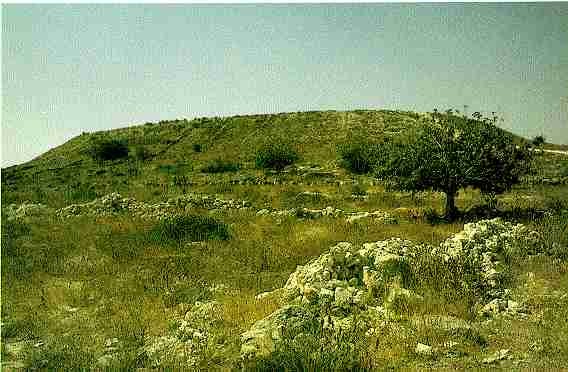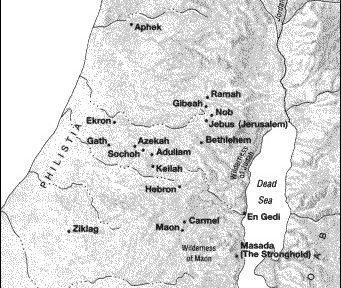This chapter is not only a commentary on David’s replacing Saul as the military leader it is also a comment on the army and on Saul. Saul and his army shrink in fear before Goliath. I don’t think it is a spoiler alert but David slays the giant in God’s strength for His glory.
This chapter is not only a commentary on David’s replacing Saul as the military leader it is also a comment on the army and on Saul. Saul and his army shrink in fear before Goliath. I don’t think it is a spoiler alert but David slays the giant in God’s strength for His glory.
Map of Israel before David was king. This map shows the place where David met Goliath.
It seems from verses 1-11 that the people of Israel forgot an important part of their existence; they are the people of God, making them the army of God, and making them invulnerable as long as they are working toward His purpose. God called them to rid the nation of Philistines. It seems they could not remember that God promised them the land and promised that He would be with them. Partly because of Saul and his rebellion against God, partly due to their preoccupying their mind with the circumstances of the day, and partly because they were listening to the taunts of their enemy and believing what he said. Goliath reminded them each day that he was a Philistine, who the Israelites were to drive out, and that statement is true. He then told them a lie. He told the Israelites that they belonged to Saul’s army, not God’s army. The lie was enveloped in the truth and the Israelites did not take every thought captive. In so doing, they believed the lie.
Our enemy does this to us as well. He will tell us truth. For example, you are a Christian. He then will tell the lie that we cannot be accepted by God because of sinful habits. The only way to get closer to God is by breaking those habits before we attempt to get closer. We believe the lie that is in the truth and are crushed in despair. The truth is you are a Christian (if you have accepted Him into your life). The truth is you sin (we all do). The truth is you have sinful habits. The lie comes when he tells you that you have to get better before God wants you to come to Him. We cannot get better outside of Him. It is He that we go to get better. This same scheme was used on Adam in the Garden and on Jesus in the Wilderness. One fell because he relied on his own word and the other overcame because He relied on God’s Word. We need to know the truth to be free. John 17 reminds us that God’s Word is Truth and John 14 informs us that Jesus is the Truth (the Word personified in John 1). Zechariah 3 presents this truth as Satan accuses Joshua, the High Priest, of not being acceptable to God. God then rebukes Satan with the truth. Are you accurately handling the word of truth (2 Timothy 2.15)?
Goliath asks for a man to do battle with him. There is no answer, merely an interlude on what David is doing. If you recall, David was anointed as king in 1 Samuel 16. This chapter is historically out of place to confirm that David, not Saul, is the true king of Israel. After this chapter, the troops and the citizenry of Israel hail David as greater than Saul, which produces the fugitive motif of the remaining chapters. David is the hero, and Saul is the zero. The latter seeks to destroy the former.
David is obedient to his father which is a godly character trait based on the Ten Commandments (Exodus 20). He does even the menial tasks his father asks him to do. He tends the sheep, plays for Saul, and takes lunches to three of his brothers. Where were the other four?
It is in this chapter we begin to see another character trait of David. He is full of passion that leads him to the heights of glory as he slays Goliath and the depths of corruption as he murders his best general because of his adultery. His passion for God’s glory is clear here. Each day for forty days Goliath taunts not just God’s army but God as well. David needs to do something about that. When God is being dishonored, do you step up and demand it stop, even preparing in your mind for battle? Have you already prepared your mind with words for such instances? You should. Peter commands us to be ready for times such as these (1 Peter 3.15).
A moment with Goliath. He is more than nine feet tall. His job is to battle other strongmen from other armies and to strike fear into the hearts of those who see him. He has four brothers (2 Samuel 21.18-21) which would explain the five stones and not one. He was ready to take out Goliaths’ entire family. He went ready.
We know the rest of the story. David asks permission to fight Goliath. He actually begs Saul for this privilege. He gives testimony of all God has done in and through him. David prepares to battle Goliath. Saul gives David his armor. David refuses because he does not know how to use them. He walks out with his sling and his stones. Goliath mocks not David because he is not a man and mocks God, again. David proclaims that his power is not in his sling nor in the stones. He states his power to defeat Goliath is in God; the God of Israel will defeat Goliath. This is where David did not believe the lie. He knew this was God’s army going in God’s strength, under God’s guidance, not Saul’s nor his. He killed Goliath. The Philistines did not surrender as promised. They ran away. David took the head of Goliath to Jerusalem. Legend has it that he buried it on a hill outside the city and this is where the name “Golgotha” or “Place of the Skull” came into being. This is also the place where Christ was crucified (Matthew 27.33).
A point of interest, in 2 Samuel 21.18-22 another Bethlehemite kills another Goliath of Gath. This could be one of the brothers of Goliath. The phrase states that David and his servants killed all them. I wonder if he carried the other four stones for such a time as that. After that moment, David sings a song of thanksgiving for God’s deliverance from them and other enemies (2 Samuel 22).
The Israelites chased the Philistines, killed them. David was brought before Saul. David submitted himself to Saul’s authority. This is another character trait of David that is evident in the remaining chapters of 1 Samuel.
David and Saul’s character are compared. One followed the truth, was obedient to the Word, was submissive to authority, the authority both of his father and of Saul, and was victorious. The other lived in fear of the lies he believed and was defeated. Who would you rather be like?


